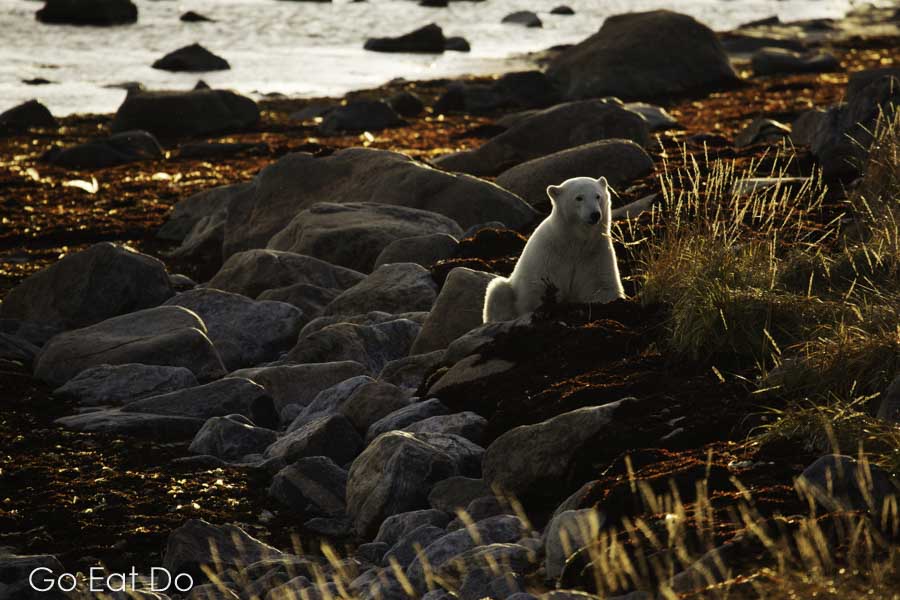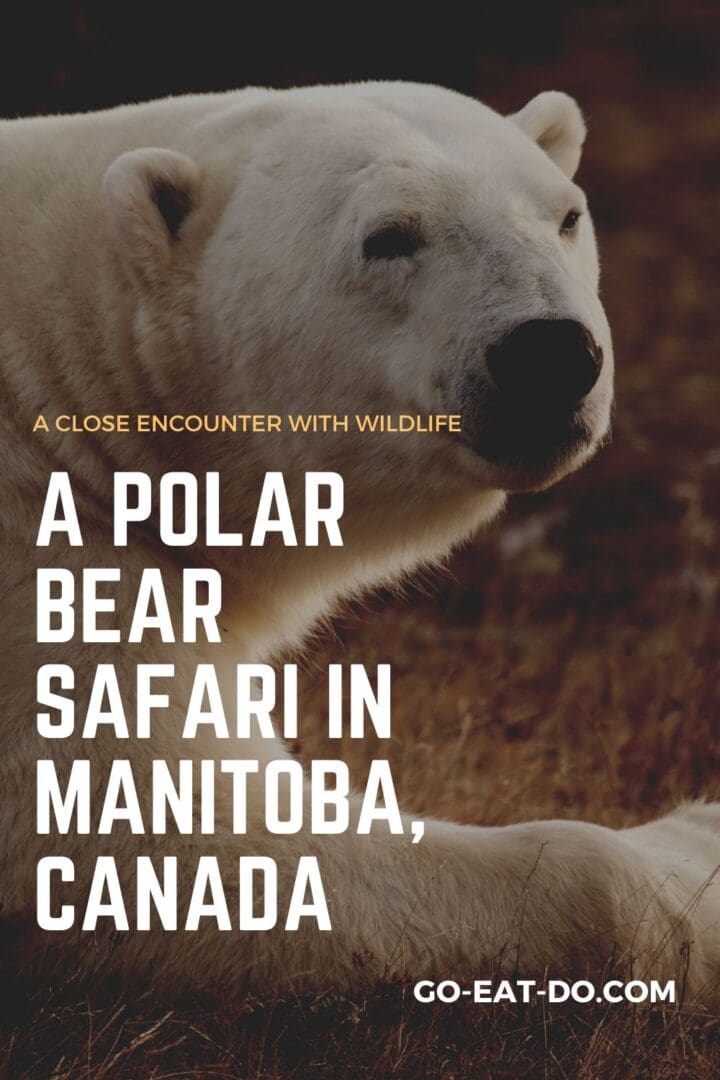A 400-kilogram polar bear lumbers towards us on the semi-frozen shoreline of the Hudson Bay in Manitoba, Canada. Just ten metres of open ground stands between one of the planet’s largest land-dwelling carnivores and the group of a dozen people that I’m standing in.
Derek, the bear expert guiding our polar bear safari, has been talking to the powerfully built male in the same tone I might use to address a staggering, unpredictable drunk on a city street. “That’s close enough,” he eventually utters with a firmness and finality that makes me glance in his direction.
A cool Canadian experience
He’s already told me to get up off my knees. I’d sunk onto them in order to photograph the polar bear at eye level. Staying down would mean I’d look vulnerable and might be considered a target.
Through my 400-millimetre lens, I could see the cream-coloured hairs on the bear’s face and limbs shifting in gusts of wind that are chilling the air temperature to -16°C (3.2 Fahrenheit). This is, quite literally, one of the coolest experiences of my life.
After standing up I bunch together with my fellow guests on this polar bear safari. Derek has already explained to us that polar bears like to avoid confrontations whenever possible. In the windswept subarctic wilderness of the taiga, 60 kilometres (37 miles) north of Churchill, even tiny injuries can sometimes prove fatal.
The lords of the arctic
Apparently, by standing as a tightly packed group we look as if we will prove tricky to take down. If only the bear knew the truth. Compared to the seals he’ll be hunting once the surface of the Hudson Bay freezes I reckon I’d make for easy prey. Trussed up in long johns, ski pants plus multiple layers of insulating clothing there’s no way I’ll be moving anywhere quickly.
Thanks to their keenly developed olfactory system, polar bears can smell seals up to 30 kilometres (18.6 miles) away. As he looks my way I momentarily and irrationally wonder whether it’s because I cut myself while shaving this morning. My heart rate rises.
Our two guides carry shotguns on their shoulders. Their weapons have never had to be fired, we learnt upon arrival at Seal River Heritage Lodge. Additionally, they each have an air horn plus a can of capsicum-based anti-bear spray on their belts.

Blowing in the wind
At first, I thought the idea of the bear spray was a joke but, essentially, it’s a more powerful version of the pepper spray now used by several of the world’s police forces. In sub-zero temperatures and blustery conditions, there’s always a risk the bear spray won’t hit the intended target. Naturally, I’m hoping things won’t escalate that far.
Derek spends his summers guiding groups to view grizzlies in British Columbia and his autumns in northern Manitoba leading people to observe polar bears, creatures he occasionally refers to as the ‘lords of the arctic’. His knowledge of subarctic wildlife and environmental issues has proven impressive. So too has his dry sense of humour.
“If you do get attacked by a polar bear you might as well enjoy the moment. No screaming—go out with your dignity intact,” he joked over a dinner featuring stuffed goose breast last night in Seal River Heritage Lodge. The windows of the lodge’s dining room are just 100 metres away. Was it the location of my last supper?
The sound of silence
I notice Derek has a couple of golf ball-sized stones in his hands. He clacks them together and the bear veers away from us. In this near silent landscape, the harsh sound of two stones being smacked together is enough for even a mighty polar bear to be repelled.
Turning, I notice Josh, the guide at the rear of the group, gives a nod of assurance.
We stand together in awe of the bear, which saunters away and eventually beds down in kelp on the shoreline, 100 metres to our right.
Collectively, people let out wows of appreciation and sighs of relief.
“You must have got some good shots there,” utters a member of the group, glancing from me to my camera. I grin, already pulling off my gloves to review my photos of our close encounter with the bear.
Seal River Heritage Lodge
Map showing the location of Seal River Heritage Lodge in northern Manitoba.:
Further information
Churchill Wild operates polar bear safaris at its Seal River Heritage Lodge from the beginning of October until the Hudson Bay freezes, around 20 November each year. During July and August, beluga whales are among the remote property’s chief draws. In September arctic safaris provide insights into the region’s wildlife and nature.
The Travel Manitoba and Destination Canada websites have information about the region’s wildlife and other tourist attractions.
Stuart Forster, the author of this post, was the recipient of the 2017 British Annual Canada Travel Award (BACTA) for Best Online Content. His work has been published by Wanderlust, Rough Guides and National Geographic Traveller.
Photos illustrating this post are by Why Eye Photography.
If you enjoyed this post why not sign up for the free Go Eat Do newsletter? It’s a hassle-free way of getting links to posts on a monthly basis.
‘Like’ the Go Eat Do Facebook page to see more photos and content.
A version of this post was first published on Go Eat Do on 16 November 2016.




Nim SIngh
November 2, 2016 at 15:50Great story Stuart!
Go Eat Do
November 3, 2016 at 07:32Thanks Nim!
Karen Burns-Booth
November 2, 2016 at 18:41A fabulous read Stuart and with humour too! Made me smile and took me right back to the moment…..great photos and what a fabulous time we had up at Seal River Lodge. Karen
Go Eat Do
November 3, 2016 at 07:34Thanks Karen, we definitely all had a great time.
Ingrid Brunner
November 22, 2016 at 15:42Congratulations Stuart, you expressed exactly how I was feeling in view of the big scary bear.
Stuart Forster
November 23, 2016 at 09:37It was a please to spend time chatting with you at the lodge. In addition to the wildlife and nature outside, I really liked the fact that the set up of the communal areas at Seal River Heritage Lodge was conducive to conversing and a convivial stay.
Irene Middleman Thomas
November 27, 2016 at 16:24I really enjoyed my Sunday morning with your new website, Stuart, especially reliving our time together with the polar bears!! You have done a beautiful job illustrating both with your words and your photos – well done!
Stuart Forster
November 29, 2016 at 08:41Thank you, Irene. Your feedback is much appreciated. Wishing you safe travels over the months ahead.